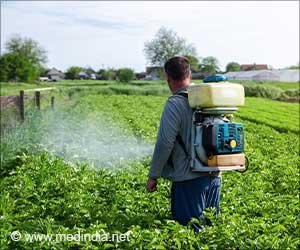Common Herbicides Impair Adolescent Brain Function

“Many chronic diseases and mental health disorders in adolescents and young adults have increased over the last two decades worldwide, and exposure to neurotoxic contaminants in the environment could explain a part of this increase,” said senior author Jose Ricardo Suarez, M.D., Ph.D., M.P.H., associate professor in the Herbert Wertheim School of Public Health.
Advertisement
Among the findings:
- Glyphosate, a non-selective herbicide used in many crops, including corn and soy, and for vegetation control in residential settings, was detected in 98 percent of participants.
- 2,4-D, a broadleaf herbicide used on lawns, aquatic sites, and agricultural crops, was detected in 66 percent of participants.
- Higher amounts of 2,4-D in urine were associated with lower neuro-behavioral performance in the domains of attention and inhibitory control, memory and learning, and language.
- Glyphosate concentration in urine was associated with lower scores in social perception only, while DEET metabolites were not associated with neuro-behavioral performance.
Herbicides Can Weed Teenagers’ Neuro-Cognitive Performance Too!
Following the introduction of genetically modified, glyphosate-resistant “Roundup-ready” crops in 1996 and 2,4-D resistant crops in 2014, there have been substantial increases in glyphosate and 2,4-D use, making them the most widely used herbicides in the world, wrote the authors.
“There is considerable use of herbicides and insecticides in agricultural industries in both developed and developing nations around the world, raising exposure potential for children and adults, especially if they live in agricultural areas, but we don’t know how it impacts each stage of life,” said first author Briana Chronister, doctoral candidate in the UC San Diego – San Diego State University Joint Doctoral Program in Public Health.
Previous studies have linked exposure to some of the most used insecticides to altered neuro-cognitive performance while other insecticides may also affect mood and brain development. Today, 20 percent of adolescents and 26 percent of young adults have diagnosable mental health conditions such as anxiety, depression, impulsivity, aggression, or learning disorders.
The authors reported that 2,4-D was negatively associated with performance in all five neuro-behavioral areas, but statistically significant associations were observed with attention and inhibitory control, memory and learning, and language. Glyphosate had a significant negative association only with social perception, a test that measures the ability to recognize emotions, while DEET metabolites were not associated with neurobehavioral alterations.
Reference :
- The Study of Secondary Exposures to Pesticides Among Children and Adolescents – (https://knit.ucsd.edu/espina/)
Source: Eurekalert
Source link
#Common #Herbicides #Impair #Adolescent #Brain #Function



